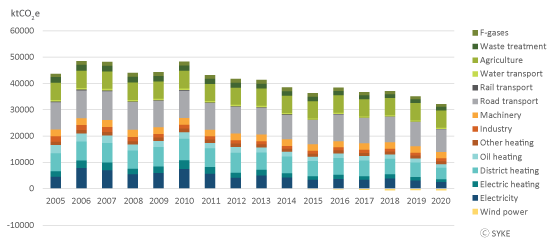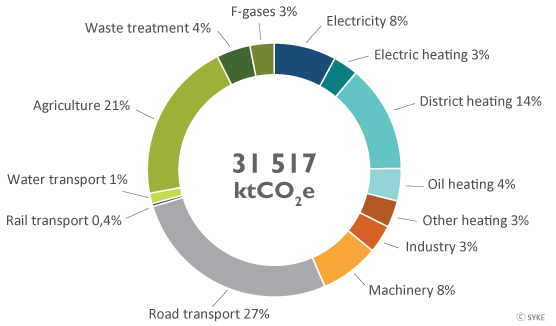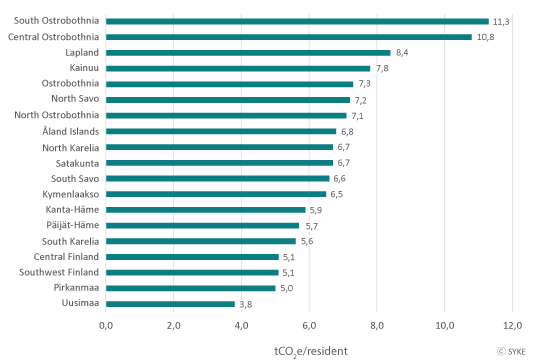
The total greenhouse gas emissions of Finnish municipalities by sector in 2005–2020. Emissions have been calculated in accordance with the Hinku calculation rules. © SYKE
According to the calculations by the Finnish Environment Institute (SYKE), municipalities’ total climate emissions decreased by 8.7% in 2020 from the previous year.
The biggest decrease occurred in the emissions from electricity usage (-35%). Emissions from electricity usage fell due to the switch from fossil fuels to wind power and decreased electricity consumption as a result of the warm year.
Emissions also decreased in other sectors in municipalities. District heating was increasingly produced with biomass, and oil heating was replaced by alternative heating methods. However, when examining emissions reductions in district heating, it should be noted that the calculations do not include the effects of biomass harvesting on the carbon balances of the land use sector. Road traffic emissions were also reduced in almost all municipalities.
“The final results confirm that the emissions development was positive in 2020. In addition to the further clarification of the preliminary data, the emissions results changed with the fine-tuning of the calculation principles, which now make regional calculation more consistent with the national greenhouse gas inventory,” says Santtu Karhinen, Senior Research Scientist in charge of the calculation at SYKE.
In the new calculation method, emissions from the separate heating of industrial buildings are included in industrial emissions, whereas they were previously reported in heating method-specific results. The change may affect emissions according to the Hinku calculation rules, as industrial emissions included in emissions trading are excluded from the calculations.
Positive emissions trends can also be observed over a longer period of time. Emissions decreased in almost all Finnish municipalities in 2005–2020, with an average change of -24.7%.
In 2020, the main sources of emissions were road transport (27%), agriculture (21%), district heating (14%) and electricity consumption (heating and other consumer electricity totalling 11%).

Distribution of total municipal emissions in 2020. Emissions have been calculated in accordance with the Hinku calculation rules. © SYKE
Considerable differences in emissions per resident between regions
Emissions per resident fell in all regions from the previous year. However, there are considerable differences between municipalities and regions in the sectoral distribution of emissions and their development. Emissions per resident are lowest in the southern regions, as in the previous year.
Regional differences are explained by differences in industrial structures, geographical factors, weather conditions and fuel use in district heating.

Greenhouse gas emissions per capita in the regions in 2020. Emissions have been calculated in accordance with the Hinku calculation rules. © SYKE
Emissions calculation continuously being developed
SYKE's emissions calculation system ALas covers all Finnish municipalities and 80 emission sectors. Emissions and energy consumption are calculated annually for all municipalities and sectors. The calculation model is updated as necessary; for example, on the basis of new available data.
The preliminary data calculation of greenhouse gas emissions (ALasPre), published in August 2021, provided more up-to-date information on emissions development. Not all the data used in the final calculations are available when preliminary results are calculated, which is why the results published now differ slightly from the preliminary data.
“When comparing the preliminary data for 2020 with the final results, the emissions from transport, agriculture and waste treatment, among other things, are very similar. On the other hand, the accuracy of the preliminary calculation still needs to be improved, especially with regard to the use of district heat and electricity,” says Santtu Karhinen, Senior Research Scientist in charge of the calculation at SYKE.
The municipal emissions calculation system has received funding from the Life IP Canemure project of the European Union.
Read more: Emissions calculation services under development (news 4th May 2022)
Emissions calculation materials are publicly available:
Graphs
Further information
- Santtu Karhinen, Senior Research Scientist, Finnish Environment Institute, tel. +358 29 525 1889, firstname.lastname@syke.fi
- Johannes Lounasheimo, Senior Specialist, Finnish Environment Institute, tel. +358 29 525 1008, firstname.lastname@syke.fi
- Juha Grönroos, Senior Research Scientist (Agriculture), Finnish Environment Institute, tel. +358 29 525 1128, firstname.lastname@syke.fi
- Sampo Pihlainen, Senior Research Scientist (Rail and water transport), Finnish Environment Institute, tel. +358 29 525 2225, firstname.lastname@syke.fi
- Tommi Forsberg, Coordinator (F-gases), Finnish Environment Institute, tel. +358 29 525 1116, firstname.lastname@syke.fi
- Jouko Petäjä, Senior Research Scientist (Landfills), Finnish Environment Institute, puh. +358 29 525 1508, firstname.lastname@syke.fi
- Eija Ferreira, Senior Research Scientist (Oil and other separate heating), Finnish Environment Institute, tel. +358 29 525 227, firstname.lastname@syke.fi
- Professor Jyri Seppälä, National Director of the HINKU network, Finnish Environment Institute, tel. +358 29 525 1629, firstname.lastname@syke.fi